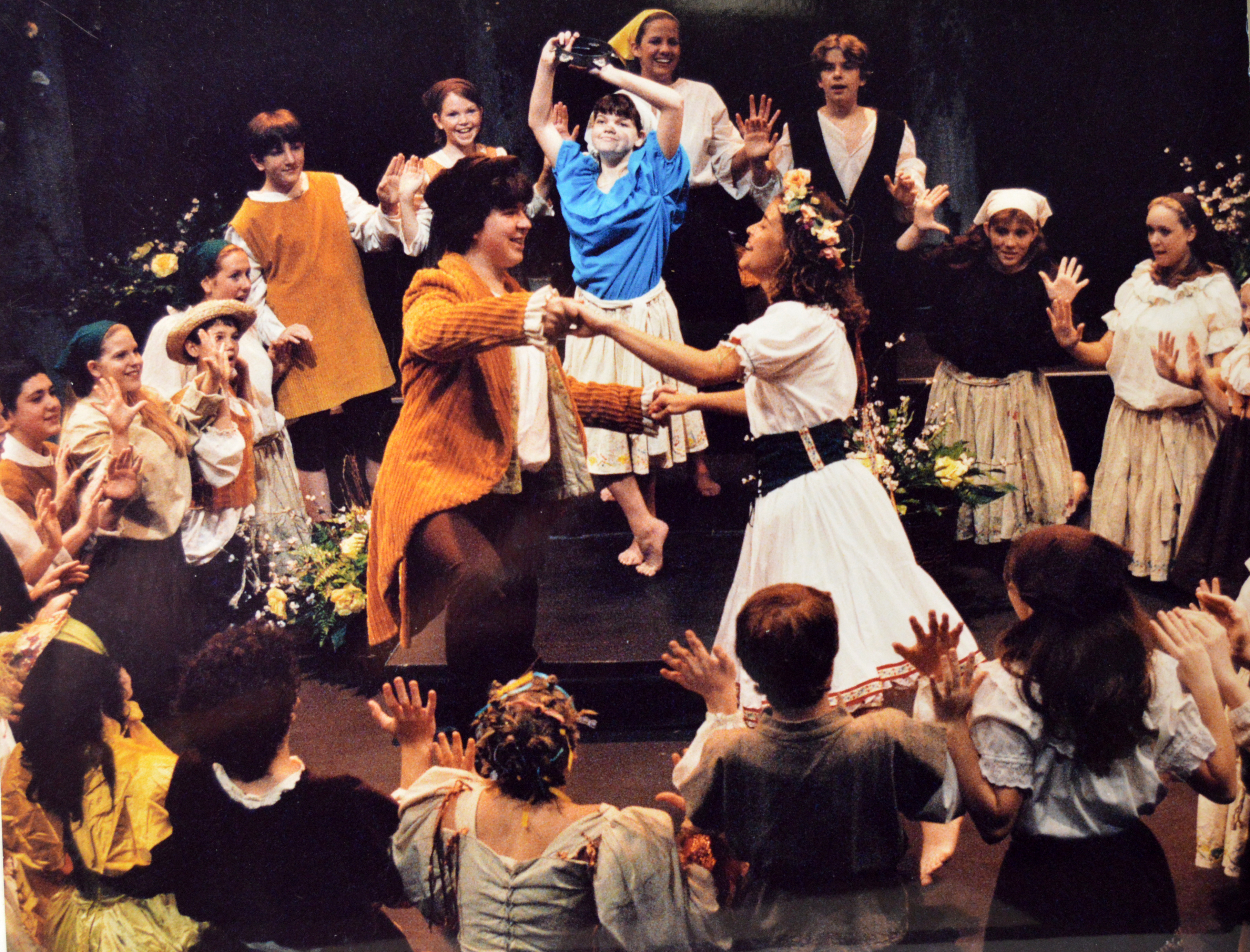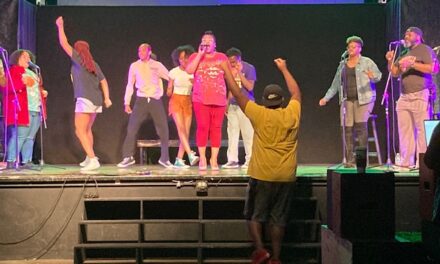A Code of Conduct for the Louisville Arts Community
By Marcy Ziegler
Entire contents are copyright © 2019 by Marcy Ziegler. All rights reserved.
Marcy Ziegler is the President and co-founder of Company OutCast, a community theater and film company dedicated to increasing opportunities for underrepresented people in the arts. She has been a musician and actor for many years, and has produced, costumed, directed, written, music directed and edited numerous works for local productions. She is an organizer for the Louisville Community Theater Meeting, sings with two bands, and plays with an all-female improv troupe called The Hystericals. She teaches law at the undergraduate level and was a trial court prosecutor in a past life.
If you’ve been a part of the Louisville arts community for any length of time, you’ve heard the rumors.
The director who gets a little too touchy with the young female actors. The actor who routinely shows up drunk and high. The musician who decided that tech week was a good time to line up other gigs.
Stories about unprofessional behavior in the arts community aren’t new. What might be new, however, is our collective desire to do something about them. Whether as a byproduct of the #Metoo movement, increased diversity in the power structure, or just the realization that we can do better, many people want to see some changes.
Several years ago, interested members of the community began a process that culminated in 2019 in the drafting of a Code of Conduct for the Louisville Arts Community. With the help of the Louisville Community Theater Meeting group, artists from all over the region submitted valuable input and over the course of a year it was refined into a working document. It is designed to be voluntary—arts organizations and individuals can choose to virtually “sign on” to it and use it as an operational guide. Current signatories include Acting Against Cancer, Company OutCast, and Teatro Tercera Llamada, among others.
The Code attempts to give all of the members of the community—the talent, the production team, the crew—a more even footing on which to discuss sensitive issues. It defines some of the basic expectations community members should have relative to consent, professionalism and decorum. It sets up peer mentoring—a system in which a member with a problem can get help from someone outside of a production to address a difficult situation. It encourages organizations and individuals to be more inclusive, more respectful, and more professional without taking away the creative liberties we all want artists to enjoy.
As an attorney and a member of this community, I drafted and reviewed the Code with the legal implications in mind. I wish I could say that we’re in a place now where people who treat other people poorly will be punished. I can’t say that. I wish I could say that we have a place to share information about all of the bad apples. We don’t. We likely never will. But we at least have a resource for that uncomfortable 18-year old who doesn’t want to be alone in the dressing room with her director. And that’s a start.
The Code appears below, but you can also visit https://docs.google.com/document/d/1Ir2W4B-qLkvZHoSMzxOgu-2abpR51BzErPkaRCnZNVM/edit?usp=sharing or email companyoutcast@gmail.com for a copy. To sign on to the Code for yourself or an organization, email companyoutcast@gmail.com or contact the Louisville Theater Community group on Facebook. More information on the list of signatories will appear there and be publicized at upcoming meetings.
Louisville Arts Code of Conduct
PREAMBLE
The local arts scene is vibrant, accepting, and adds so much to the lives of those of us who enjoy it. In order to enhance the experience of the entire community, we agree to abide by the following set of standards (referred to herein as ‘this Code”) designed to keep participants safe, to encourage the open and collaborative sharing of ideas, and to foster creativity. We understand that standards must evolve over time, and that many situations may call for unique approaches. We affirm our commitment to high standards even as they evolve, and understand that this list is neither exclusive nor all encompassing. We also acknowledge that most members of this community already exceed these standards, but by memorializing them we hope to give clarity to those who seek it and direction to those who work with us in the future.
DEFINITIONS
Member: any individual working in the Louisville arts community, whether in theater, music, visual art or other creative forms, whether in a professional or volunteer capacity
Manager/managerial member: any individual working in the arts community in a position of power. This includes but is not limited to board members, directors, producers, company managers, stage managers, music directors and choreographers.
Non-managerial member: members who do not make managerial decisions. This will change by production, but may include actors, musicians, artists, dancers and other performers.
SAFETY
Everyone has the right to work in an environment that is physically and emotionally safe. Signatories to this Code agree to foster safe environments by following these guidelines:
- Physical Safety
- Physical safety will be the responsibility of ALL Members, including managerial and non-managerial members.
- Managerial members will be proactive about the safety of all participants in all events. This will include the safety of combat scenes, sets, costumes and blocking, as well as the appropriate use of facilities and props.
- Managers will listen to complaints about physical safety brought to them by any other members and act quickly and appropriately.
- Managers agree to the appropriate use of safety measures like backstage lighting, glow tape, and monitors.
- Managers agree to use safe props, and agree that unless there is an absolute necessity, no actual weapons (knives, guns, razors, glass bottles) will be used at any time.
- All members agree to be responsible with props, stage combat and blocking. This includes the responsibility not to use substances to the point of compromising safety.
- Members agree to be proactive and reactive about the safety of other members and the community. This may include but is not limited to walking in groups to and from venues, being aware of audience members who may become harassing and helping actors who need physical assistance.
- Harassment
- Harassment is defined under this Code to include, but is not limited to, the following behaviors:
- Aggressive or threatening behavior
- Assault, battery, or threatening battery
- Consistently rude behavior, such as cursing another member out, touching them offensively, or screaming at them
- Racist, sexist, transphobic, or other objectively offensive behavior, whether directed towards an individual or generally
- Stalking
- Bullying
- Members agree never to engage in harassment of other members in any capacity.
- Harassment is defined under this Code to include, but is not limited to, the following behaviors:
- Accessibility
- Signatories to this Code agree that people of differing abilities should be welcome in the community and encouraged to participate in events. Members agree that events should be as accessible as possible and agree to be proactive about accessibility both on and off stage. Whenever possible, managerial members will use accessible venues and accommodate for people of differing abilities. Members are encouraged to incorporate accommodations as much as possible. Accommodations might include subtitles, translation, interpretation, special performances for people on the autism spectrum among other things. Members agree to foster inclusion of people who may need accommodations in order to participate in performances. This section is not intended to limit the use of venues that are not completely accessible, but to encourage the community to increase accessibility whenever possible.
- Consent
- Members agree that consent to certain behaviors, including but not limited to physical contact, is paramount to safety. To that end, members agree to the following:
- Whenever physical contact is required between members, consent shall be affirmatively requested when possible.
- Consent shall be knowing, voluntary, and affirmatively communicated.
- Members shall encourage the affirmative discussion of consent in all physical contact situations with other members.
- Members agree that consent to certain behaviors, including but not limited to physical contact, is paramount to safety. To that end, members agree to the following:
- Working with Children
- Members agree that children benefit from a vibrant arts community and should be a part of the community when appropriate. To that end, when children are participants in events, members agree to the following:
- To abide by heightened standards of professionalism around minors. This may include avoiding foul language, avoiding discussions about adult situations and telling off color jokes.
- To communicate freely with the parent or guardian of a minor about the minor’s responsibilities and expectations.
- To allow the parent or guardian of a minor to be present at all rehearsals, providing that the parent or guardian will not be a distraction to the production.
- If a member should become aware that anyone poses a threat to or has been inappropriate with a child member, they commit to making a manager aware of the situation immediately and acting swiftly to protect the child in whatever appropriate way.
- Members agree that children benefit from a vibrant arts community and should be a part of the community when appropriate. To that end, when children are participants in events, members agree to the following:
TRANSPARENCY
Everyone has the right to know certain pieces of information about the companies they work with and the events they are involved in. This directive is not intended to open up a company or director to inquiries about casting decisions, remuneration, or anything else typically the purview of management. Examples of conduct that fosters appropriate transparency while protecting the decisions of a manager include:
- Setting a clear understanding of all managerial participants’ responsibilities and the associated chain of command for decisions.
- Setting clear guidelines for payment, or communicating clearly that participants are volunteers.
- Communicating clearly the expectations for all non-managerial participants including policies on lateness, professionalism, alcohol use, scheduling and any other responsibilities specific to an event.
- Whenever possible, members in managerial positions should be aware of all liability insurance coverage for venues, companies and individuals.
- Managerial members shall not use their positions to inappropriately influence or punish others.
PROFESSIONALISM
Members of this community understand that a certain level of professionalism is required, even if particular behaviors may be acceptable for one event or company but not for another. While specific standards should be clearly set by management (see “Transparency, above), some baseline expectations should be met by all participants.
- Participants shall strive to treat all others with respect.
- Schedule changes, whether by management or non-management, should be rare, communicated immediately, and necessary. This should include adding additional rehearsals or performances, missing rehearsals, being late, or, in an extreme situation, missing a performance.
- Non-management members in emergency situations (illness, etc.) who necessitate missing a performance should contact management immediately and do the best they can to offer ways to alleviate the situation. Of course, emergencies happen, but participants should understand that missing a performance or dress/tech rehearsal is monumentally difficult to overcome for all involved.
- All participants have a responsibility to arrive on time, sober, and ready for all calls. No participant should ever allow the use of substances to interfere with a quality performance, even if an individual theater or event’s directive should guide the specific use of substances.
- Members should address each other with respect to include the appropriate use of names, nicknames and pronouns. If a member articulates a particular way they prefer to be addressed, other members should abide by that preference.
- Members should strive to abide by all expectations set by management relative to being off book, respecting sets and costumes, and timeliness.
- All members should act professionally when representing a company or event to the public. This includes activity on social media and marketing activities.
COMPLAINTS
From time to time, members may be in a situation where they feel that these standards were not abided by. In that event, members agree to the following practices:
- Members will not penalize other members for bringing issues to the attention of others, including manager members.
- Members will bring complaints to the attention of others in a timely manner. And understand that if they do not do so, the ability to act on a complaint may be affected.
- Managerial members agree to listen to all complaints brought to them.
- All members agree to keep any relevant documentation of any issues they wish to be addressed.
- All members understand that it may be difficult for a non-managerial member to approach a managerial member with an issue, as they may fear dismissal or penalty. In that light, members agree to the following:
- Members may approach other members, including a designated group of volunteer advocates in order to discuss a violation of this Code before approaching management;
- This group of volunteer advocates will be comprised of members in all different capacities, including managerial and non-managerial positions;
- Management agrees to listen to advocates and collaborate with them, and with complaining members, on solutions to problems;
- Members agree to address all complaints quickly and fairly, but understand that not every proposed solution may be feasible.
VOLUNTARINESS/CONFLICT OF LAWS
Signatories to this Code agree that they abide by these standards voluntarily and without coercion or remuneration. Members and signatories also understand that nothing in this Code shall supersede or conflict with a member’s ability to seek redress under state, local or federal law. This Code is not designed to supplant a member’s legal rights, but to enhance them. Should this Code be interpreted to conflict with a member’s legal obligations, members should defer to the law to govern their conduct. Deviations from this Code should not be considered a basis for civil or criminal liability.




